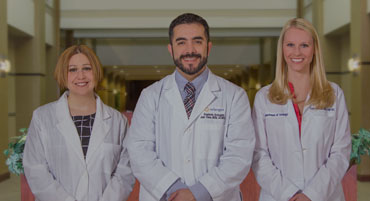Hernia, Hydrocele & Undescended Testicle in Chattanooga, TN
What is a Hernia?
 A hernia occurs where there is a weakness in the muscles and/or tissues of the abdomen. Inguinal hernia is the most common type of hernia in children and is present at birth. It develops before birth, and is more common in boys, especially preemies and boys with undescended testicles. Inguinal hernias can occur in 5% of full term infants, and up to 30% of preterm infants. It is related to the path of descent of the testes into the scrotum. Females may also have inguinal hernias, but they are much less likely.
A hernia occurs where there is a weakness in the muscles and/or tissues of the abdomen. Inguinal hernia is the most common type of hernia in children and is present at birth. It develops before birth, and is more common in boys, especially preemies and boys with undescended testicles. Inguinal hernias can occur in 5% of full term infants, and up to 30% of preterm infants. It is related to the path of descent of the testes into the scrotum. Females may also have inguinal hernias, but they are much less likely.
If you believe your child may be suffering from a hernia, contact UT Urology in Chattanooga TN today to schedule an appointment.
Schedule an Appointment Today
What is the Risk of a Hernia?
The risk of a hernia is that the bulging tissue can become trapped or incarcerated. This means the bulging tissue cannot be pushed back, which occurs in about 10% of pediatric inguinal hernia patients and 30% of premature infants. If not treated quickly, a strangulated hernia can lead to testicular shrinkage, loss of a testicle, or intestinal blockage. Long term complications can occur from delayed treatment. Emergency surgery is needed.
What Causes a Hernia?
The cause of a hernia is not known, but occurs due to a failure of the inguinal canal to close after testicular descent. Sometimes a hernia can appear along with an undescended testicle.
What are the Symptoms of a Hernia?
Hernia symptoms include the following:
- A bulge in the groin is commonly seen when the child strains or cries. In boys, the scrotum or groin swells.
- It is usually painless. However, there may be discomfort at the site of the hernia.
- A strangulated or incarcerated hernia creates tenderness in the scrotum or groin.
Call to Learn More – (423)-778-8765
How is a Hernia Diagnosed?
A hernia presents as a bulge in the groin or scrotal sac. If the swelling changes in size during the day, it may be a communicating hydrocele, which may enlarge. In a hydrocele, there is only fluid because the defect in the passage is too small to allow intestine or other abdominal contents to get trapped. A hydrocele that does not change in size may go away on its own during the first year of life.
Hernia Treatment Options
Generally, hernia treatment requires surgery in all cases. Inguinal hernias will not resolve on their own. But the timing of surgery depends on the age of the child and the severity of the hernia.
Inguinal hernia surgery is necessary in about 3 out of 100 children, and is the most common pediatric surgery. Premature infants with a hernia should have surgery before leaving the neonatal intensive care unit, because the risk of the hernia becoming incarcerated is greatest in early infancy. The type of surgery depends on many factors, including the size and location of the hernia, age, general health and the surgeon’s expertise. Discuss this with your surgeon.
Hydrocele Treatment in Chattanooga TN
What is a Hydrocele?

If you your child is suffering from a hydrocele, contact one of our locations in Chattanooga TN today to schedule an appointment.
Contact UT Urology
How Does a Hydrocele Occur?
During development, the testicles descend from the abdomen into the scrotum through the groin. Sometimes the passage does not close, and fluid drains into the scrotum. The opening usually closes before or shortly after birth. If it does not resolve within the first year of life, surgery may be recommended.
Symptoms of a Hydrocele
Hydrocele symptoms involve a swollen scrotum that usually does not cause pain or discomfort. Hydroceles don’t usually harm the testicles or cause problems later in life. However, when the hydrocele grows large and causes discomfort or does not resolve on its own, hydrocele surgery is needed.
Diagnosis of a Hydrocele
Hydroceles are diagnosed by history and physical exam. Sometimes an ultrasound is performed to confirm the diagnosis. Because inguinal hernias and hydroceles share a common cause, your doctor will also evaluate your child for a hernia.
Learn More Today – Call (423)-778-8765
Hydrocele Treatment Options
Hydroceles are common among newborn boys, and in most cases, resolve on their own within the first 6-12 months. More severe cases may need hydrocele treatment, which involves a simple operation during the first year of life. Hydroceles are often associated with inguinal hernias, and surgery is performed to correct both problems.
Undescended Testicle Treatment in Chattanooga TN

If your child has an undescended testicle, contact UT Urology in Chattanooga TN today to schedule an appointment with an expert.
Contact Us Today
Diagnosis of an Undescended Testicle
Usually the testicle can be located during a physical exam. If the testicle cannot be felt, this means it is located in the abdomen, is absent or very small. In this case, the surgeon will use a laparoscopic technique to determine if the testicle is present, its condition and location. If found, and depending on the location and condition, the surgeon can move the testicle in to the scrotum.
Why Does a Testicle Fail to Descend into the Scrotum?
- It may have descended incompletely and remain in the groin
- It may have failed to form at all, or formed abnormally
- It may have shrunken due to twisting of the blood vessels
- It may be due to abnormal hormonal influences
Risks of an Undescended Testicle
Undescended testicles exhibit diminished growth and function. Another risk of an undescended testicle is that it can twist, which can cause damage to or loss of the testicle. Generally, an undescended testicle raises the risk of infertility and testicular cancer later in life. Often, undescended testicles are associated with inguinal hernias since the path that the testicle takes to the scrotum is the site of most inguinal hernias.
Call UT Urology – (423)-778-8765
Undescended Testicle Treatment Options
The goal of surgery is to place the undescended testicle into the scrotum. If the child’s testicle has not descended by age 6 months, it is unlikely to descend. Surgical treatment for an undescended testicle is usually recommended before age 1, and any companion hernia can be repaired at the same time.
Early undescended testicle treatment reduces the risk of future problems. Results from surgery depend on the condition of the testicle. Most often, the testicle develops normally in the scrotum. But if the testicle is abnormal, it may never grow properly. The further the testicle is from the scrotum, the more likely that growth and function are affected.
In Chattanooga, Tennessee and Alabama, UT Urology pediatric urologists can help your child. They are world-class, board certified surgeons who regularly perform surgical procedures to repair hernias, hydroceles and undescended testes on babies and children.
If your child is suffering from a hernia, hydrocele, or an undescended testicle in Chattanooga, and East Ridge, TN, call our office or fill out our contact form to schedule a consultation.

